

Infographics, Timelines and Concept maps. Linoit. Learning & Teaching 2015. Comm Skills. Teacher Behaviors. Nonfiction Literacy and Current Events. 8 Strategies Robert Marzano & John Hattie Agree On. Robert Marzano and John Hattie have both reviewed research into what teaching strategies make the biggest difference to students’ results.
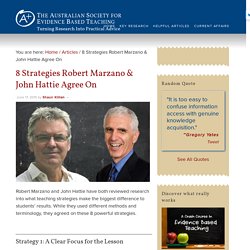
While they used different methods and terminology, they agreed on these 8 powerful strategies. Strategy 1: A Clear Focus for the Lesson John Hattie highlights how important it is for you (and your students) to be clear about what you want them to learn in each lesson. According to Hattie, teacher clarity is one of the most potent influences on student achievement. Robert Marzano agrees, including lesson goals in his top 5 list of factors that affect how well students do at school. Hattie states that lesson goals: Clearly state what you want your students to learnCan focus on surface or deep learning (or both)Must be challenging for the students relative to their current mastery of the topicMay be grouped (i.e. a single lesson may have more than one goal)Need to be shared with the students. Teacher2Teacher is a community of teachers like you. Teaching Secrets: Ending the Year on a High Note. Published Online: May 14, 2012 By Cossondra George Ah, the home stretch.
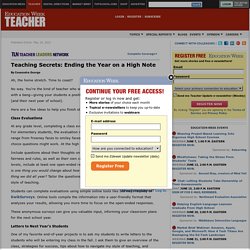
Time to coast? No way. You're the kind of teacher who wants to end this year with a bang—giving your students a positive send-off to summer (and their next year of school). Here are a few ideas to help you finish strong. Class Evaluations At any grade level, completing a class evaluation is a powerful experience for students. Include questions about their thoughts on the content of the class, the workload, your fairness and rules, as well as their own contributions and effort in the class.
Students can complete evaluations using simple online tools like Survey Monkey or KwikSurveys. These anonymous surveys can give you valuable input, informing your classroom plans for the next school year. CPD Inspiration. The Gut-Level Teacher Reflection. Sometimes I will be going about my normal day and I’ll notice a negative haze has descended on me — some vague feeling of apprehension, guilt, or maybe self-pity — but I won’t have a clue where it came from.
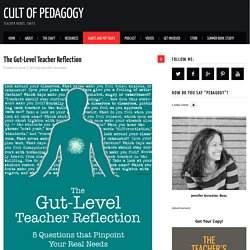
If I ignore this feeling, it just gets worse. But if I stop and try to trace it back to where it came from, I can usually pinpoint something: An off-the-cuff comment that sparked jealousy. A news preview that spun me into a worry spiral. The facial expression of an acquaintance that planted a seed of insecurity. Once I nail down the source of a bad feeling, I can think it through and make a plan to deal with it. This practice can be applied to our teaching as well. Here are five questions that can help you listen to your body’s emotional responses and uncover problem areas in your teaching. [Download these questions in a free worksheet from my store at Teachers Pay Teachers] 1. 50 Ted Talks Every Educator Should Check Out (2014 Edition) Professional Development for Teachers on Pinterest. Professional Learning That Matters.
10 Keys to Making Professional Learning Meaningful By Samantha Cleaver Chances are, as you look at your calendar of scheduled professional learning days, you aren’t overcome with excitement.
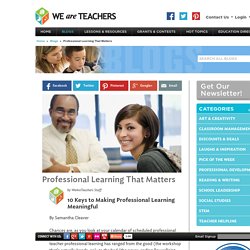
Traditionally, teacher professional learning has ranged from the good (the workshop that’s actually hands-on), to the bad (the never-ending PowerPoint presentation), to the ugly (remember that one presenter…). But, as the Common Core State Standards become the norm, the new standards and the expectations around problem solving and critical thinking are prompting a new look at teacher development. In the process, more districts and schools are thinking of ways to make professional learning meaningful and engaging. The biggest challenge in teacher development isn’t teaching teachers something new, but ensuring that knowledge and skills are applied in the classroom. Triangulation in Educational Research. Triangulation in Educational Research What - Triangulation is the application and combination of several research methodologies in the study of the same phenomenon.
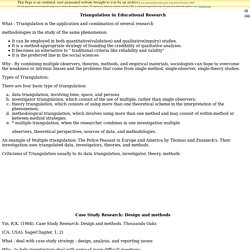
Educational resources #2. Teaching and Learning. Training. The 13 MUST Know Professional Development Websites for Teachers. 1- Education World This is a great website that offers all the resources you need to grow professionally.
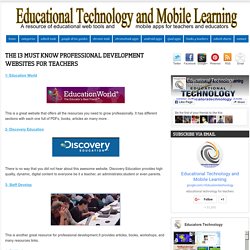
It has different sections with each one full of PDFs, books, articles an many more . 2- Discovery Education There is no way that you did not hear about this awesome website. Discovery Education provides high quality, dynamic, digital content to everyone be it a teacher, an administrator,student or even parents. 3- Staff Develop This is another great resource for professional development.It provides articles, books, workshops, and many resources links. 4- Ed Week Ed Week is a also one of the leading websites in education. Professional Development with the Experts Through Twitter - Finding Common Ground. Teacher Professional Development. The Secret of Self-Regulated Learning.
The Role of Motivation in Self-Regulated Learning. Self Regulated Learning & Attention. Proto-professionalism: how professionalisation occurs across the continuum of medical education - Hilton - 2004 - Medical Education. Workplace-based assessment as an educational tool: AMEE Guide No. 31, Medical Teacher, Informa Healthcare. AMEE Guide Workplace-based assessment as an educational tool: AMEE Guide No. 31 2007, Vol. 29, No. 9-10 , Pages 855-871 (doi:10.1080/01421590701775453) John Norcini1† and Vanessa Burch2 1Foundation for Advancement of International Medical Education and Research, PhiladelphiaUSA 2University of Cape Town, South Africa JOHN J.
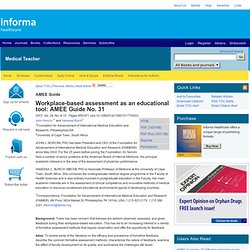
Student learning strategies, mental models and learning outcomes in problem-based and traditional curricula in medicine, Medical Teacher, Informa Healthcare. Original Student learning strategies, mental models and learning outcomes in problem-based and traditional curricula in medicine 2006, Vol. 28, No. 8 , Pages 717-722 (doi:10.1080/01421590601105645)
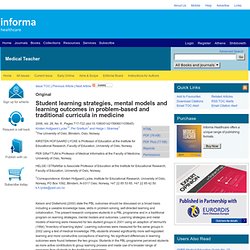
Reflection and reflective practice in health professions education: a systematic review. The importance of reflection and reflective practice are frequently noted in the literature; indeed, reflective capacity is regarded by many as an essential characteristic for professional competence.
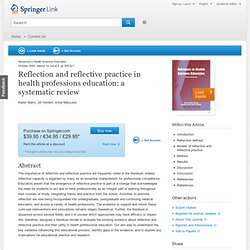
Educators assert that the emergence of reflective practice is part of a change that acknowledges the need for students to act and to think professionally as an integral part of learning throughout their courses of study, integrating theory and practice from the outset. Activities to promote reflection are now being incorporated into undergraduate, postgraduate and continuing medical education, and across a variety of health professions. The evidence to support and inform these curricular interventions and innovations remains largely theoretical. Further, the literature is dispersed across several fields, and it is unclear which approaches may have efficacy or impact. Self-Regulation. Critical & Creative Education. A blog to share my thoughts and professional development. — Musings of a Mathematics Teacher who Loves Technology.
Expanding my PLN. Free Professional Developement for teachers. Professional Development. Research Process Workshop. Webinars. A - Learning Communities. DISCIPLINARY STUDY. Teacher Badges. Staff Appraisal. Developing Teachers.com. Technology Professional Development. Leadership Development. Training Teachers.